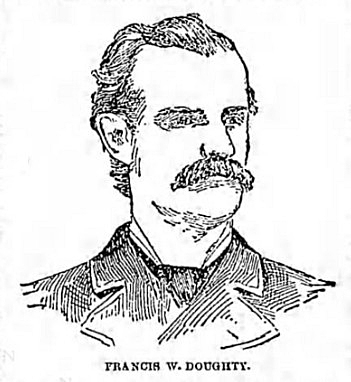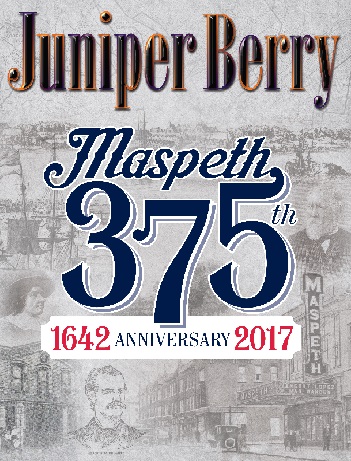From “A Relic of Village Days”, Brooklyn Eagle, June 7, 1891
The Doughty family in America are all descendants of one individual, the Rev. Francis Doughty, who emigrated from England and settled at Taunton, Mass., about the year 1633, which places him among the earliest of the Puritan fathers following in the footsteps of the Mayflower pioneers. The Brooklyn Doughty family are the descendants of Elias, second son of the Rev. Francis Doughty. Their first appearance in the city is believed to have been about the year 1690; there is, however, no absolute proof in the possession of the writer that this date is correct, although it can’t be more than a decade or so out of the way.
The Doughty family in England is of exceedingly ancient origin, dating back before the Norman Conquest. Originally the name was spelled “Doghtig”, and its significance now used in derision, was certainly expressive of the characteristics of the race. The first Doughty mentioned in history was one of Sir Francis Drake’s party on the Golden Hind, in the famous voyage performed by that ship round the world. Accused of mutiny, this individual, Thomas by name, was convicted and beheaded off the coast of Patagonia. The accusation was manifestly false and prompted by the jealousy of Drake.
Whether or not the Rev. Francis Doughty was an immediate descendant of Thomas is not known. The first notice of him is found in the annals of Taunton and reads as follows:
“Cohannet, alias Taunton, is in Plymouth patent. There is a church gathered there of late and some ten or twenty of the church, the rest excluded. Master Hooke, Pastor; Master Street, Teacher. One Master Doughty (Rev. Francis) opposed the gathering of the church there, alleging that according to the covenant of Abraham, all men’s children that were of baptized parents, and so Abraham’s children, ought to be baptized, and so spake in public, or to that effect, which led to a disturbance, and the ministers spake to the magistrate to order him out, the magistrate commanded the constable who dragged Master Doughty out of the assembly.”
But for this disagreeable incident, the Doughty family probably would never have played their part in the history of Brooklyn. Much excitement followed the church wrangle, and it resulted in about one hundred families leaving the Cohannet colony and following the fortunes of Mr. Doughty. By this party it was determined to leave English colonies and apply to the Dutch for a grant of land upon which they could settle and enjoy the freedom of conscience which the straight-laced Puritans demanded for themselves, but were unwilling to accord anyone else. With his wife and children, Doughty proceeded to the island of Aquetneck, the present site of the city of Newport, RI, where his friends soon joined him. A regular association was organized and Mr. Doughty sent to New York to interview Governor Kieft. So successful was this visit that the Dutch authorities immediately granted Mr. Doughty a tract of land of 13,332 acres at Mespat, which embraced nearly the whole of Newtown, Maspeth and a part of Flushing. Here the Doughtyites settled in the year 1642, and from their efforts a successful colony was soon established. Indeed, its success was so great that it excited the jealousy of Kieft, as will presently be seen. The Doughty patent is recorded in the secretary of state’s office at Albany, book of patents, C.G. page 49. It bears the date March 28, 1642.
Mr. Doughty seems to have been a chronic objector and a man of most decided opinions. Preaching to his flock weekly he took occasion to criticize certain acts of Governor Kieft, and trouble was the result. The director and council of the New Amsterdam colony in April 1647 rescinded the Doughty patents, dividing the property among the members of the association, leaving Mr. Doughty only his bouwery (farm) and the lands he had in possession. The Doughty bouwery occupied the land on the east of Flushing Bay, now known as Stevens’ (Willets) Point.
To the decision of Kieft, Mr. Doughty strongly objected, regarding it as not only unjust, but in direct violation of his patent, therefore he appealed from the sentence, which offended Kieft, who had previously cut off the right of appeal to the courts of Holland, and telling Doughty that his judgment was final and absolute, the despotic governor fined the defenseless clergyman $10 and locked him up for 24 hours in the common jail. Discouraged at this, Mr. Doughty requested the director general of New Netherlands “that as he had lived and done duty a long time with suitable support and as his land was now confiscated” he might be permitted to take ship for the West Indies or the Netherlands. The request was refused, as the director general had no desire to have his acts laid before the diet. Later Mr. Doughty was minister at the Flushing church, where he preached a year for the sum of 600 guilders. He finally departed for the “English Virginias” in 1648.
This is one side of the story – Doughty’s side. The colonial records show the Dutch view of the case to be different. Without going into this in detail, we will simply state that the Dutch claimed a debt of 1,100 florins from Mr. Doughty, which he refused to pay. It was out of this that the trouble arose. The last notice of this man is found in Dr. O’Callaghan’s colonial documents where it reports a commissioner sent from New York to the Maryland colony as saying that during a visit to Cecil, Lord Baltimore, he met Mr. Doughty at a dinner given by the Maryland governor and found him “looking much the same” as when he last saw him in New Amsterdam and very bitter against the Dutch. After the burning of Mespat village in 1643, Mr. Doughty sought refuge in New Amsterdam with all his followers. Here they resided for several years, Mr. Doughty purchasing property just outside the fort. Within the fort he established an English church and preached regularly to his flock. Thus the Rev. Francis Doughty was the first preacher in the English language in New York City – a fact we never saw commented on in any history of New York. Directly descended from Rev. Francis Doughty, through his son, Elias, is the forgotten Brooklyn family for which the street running past the Eagle’s back door is named.



